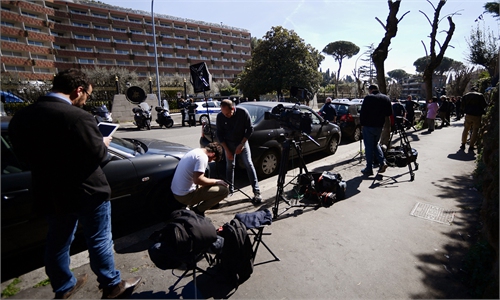China criticizes US' inconsistency on Taiwan question at Yang-Sullivan meeting as US fails to impose its Ukraine stand

Yang Jiechi (1st L), a member of the Political Bureau of the Communist Party of China (CPC) Central Committee and director of the Office of the Foreign Affairs Commission of the CPC Central Committee, meets with U.S. National Security Advisor Jake Sullivan (1st R) in Rome, Italy, March 14, 2022.(Photo: Xinhua)
China's top diplomat Yang Jiechi met with US National Security Advisor Jake Sullivan in the Italian capital of Rome on Monday, elaborating on China's position on the situation in Ukraine and calling on the international community to jointly support Russia-Ukraine peace talks. The two sides also had candid, in-depth and constructive discussions on China-US relations and agreed on jointly implementing the consensus reached by the two heads of state and managing the differences.
Although some US media described the 7-hour meeting as intense, covering a wide range of issues including the Ukraine situation and China-US ties, the White House summarized the meeting in an 80-word readout. Some Chinese experts said though the high-level meeting between senior Chinese and US officials were a positive signal to the world at such a turbulent time, there are still major divergences between the two sides, particularly on their positions concerning the Ukraine crisis.
The two sides agree to jointly implement the consensus reached by the two heads of state, increase understanding, manage differences, expand consensus and strengthen cooperation, so as to accumulate conditions for bringing China-US relations back on the track of sound and steady development.
The senior Chinese diplomat said President Xi Jinping has proposed mutual respect, peaceful coexistence and win-win cooperation as the three principles in developing China-US relations in the new era, which has charted the course for the development of the bilateral ties. Yang said that US President Joe Biden responded by saying the US does not seek a new Cold War or to change China's system, nor will it oppose China through strengthening alliances, support "Taiwan independence," or seek confrontation with China.
"Given the readout from the White House, we can see that the US only cares about the core issues of its concern, but China paid much attention on China's core interests. There's a major divergence in that the US hopes China to solve the Ukraine crisis," Li Haidong, a professor from the Institute of International Relations of China Foreign Affairs University, told the Global Times on Tuesday. He also noted that forcing Beijing to accept the US stance during the talks reflects unhealthy mindset of Washington.
The meeting spanned at least seven hours, some US media reports said, which was also described as intense as China's position on Russia-Ukraine conflict was put under the spotlight. A senior US official was quoted in a Reuters report on Monday saying "We have deep concerns about China's alignment with Russia at this time, and the national security adviser was direct about those concerns and the potential implications and consequences of certain actions."
All parties should exercise maximum restraint, protect civilians and prevent a large-scale humanitarian crisis, Yang said, adding that China has provided emergency humanitarian assistance to Ukraine, and will carry on its efforts to this end.
He also stressed that China firmly opposes any words and deeds that spread false information, distort and smear China's position.
Although the Ukraine issue was a priority for the US during Tuesday's meeting to pressurize China to take a stand, it seems that the attempt has been unsuccessful, Wu Xinbo, dean of the Institute of International Studies at Fudan University, told the Global Times on Tuesday.
"Not only did China's position remain unchanged, but it also refuted rumors and false information that the US had been spreading. It means that the goal of the US for this meeting has failed," Wu said.
Within China-US relations, Yang stressed that the Taiwan question concerns China's sovereignty and territorial integrity. The current US administration has pledged to adhere to the one-China policy and not to support "Taiwan independence" in regard to the Taiwan question, but its actions are obviously inconsistent with its statements, he said.
Experts noted that it is worth noticing that when Yang talked about China-US relations, he particularly brought up the Taiwan question, as after the outbreak of the conflict between Russia and Ukraine, many Western media have been hyping the relevance of the Ukraine issue with the Taiwan question, but these two are fundamentally different.
"The Taiwan question is China's core interest and concern, therefore we must emphasize this point to the US at such a time. It also shows that China has been very unsatisfied with the Biden administration's stances toward the Taiwan question," Wu said


